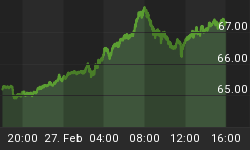While most investors seem satisfied using the shares of mining companies as high-beta substitutes for the metal, more and more individuals are becoming interested in owning some physical gold itself. Unfortunately, most investors don't know how best to buy and store the precious metal.
It used to be that investors would simply visit the corner coin shop to buy gold bullion, but finding a precious metals dealer who would stand by his quoted price in a volatile market wasn't always a sure thing. More importantly, there is a challenge faced by anyone wanting to buy more than a few one-ounce coins: storage. Unless one is comfortable burying gold in the backyard, there is always a cost in securely storing bullion.
Thankfully, products that combine the purchase and storage of physical gold have been improving dramatically, with one new entrant, bullionvault.com, providing a particularly attractive alternative. Here's how such offerings have evolved:
Exchange-Traded Gold Choices
Many investors seem to think that the ability to purchase physical metal through an exchange-traded vehicle arrived only in late 2004 via GLD, the World Gold Council's ETF that holds gold bullion through intermediaries. Gold bugs know, however, that for nearly 20 years U.S. investors have had access to Canada's Central Fund (AMEX symbol: CEF).
While the Central Fund is similar to the upstart GLD in that it also holds gold bullion (and silver) in some form of allocated storage, unlike GLD it behaves like a traditional closed-end fund, sometimes trading at a big premium or discount to its own net asset value depending on whether gold is in or out of favor. When trading at a significant discount, this is an interesting stock to consider; today's premium of almost 10%, however, suggests gold can be had much more inexpensively elsewhere, certainly in GLD if looking only for an exchange-traded vehicle.
Where both of the above exchange-traded vehicles fall short, though, is in the area of convertibility. Part of the reason for buying a physical gold product is the potential to take delivery in the future. CEF offers no such convertibility and GLD only allows it for purchases of 100,000 shares - nearly a $5.5MM investment at today's prices.
Perhaps convenient for trading, the ETF products don't measure up as solutions for those who might wish to one day take hold of their shiny treasure.
Internet Offerings
A few web-based solutions combine the purchase and storage of bullion in a manner similar to the above ETF's, yet one has emerged to clearly stand out as the best overall online product: BullionVault.
And don't just take my word for it. In a recent email to readers, one writer at the acclaimed Agora Publishing called it, "...the most exciting development in the gold market I've ever witnessed." That same writer went on to say, "Bullion Vault enables you to trade the purest gold at the tiniest spreads - with no delivery charges, minimal insurance fees, and storage costs to make your local bank blush." High praise, indeed.
Like its competitors, a simple online application also opens your account. Here, however, fees are wafer thin - the maximum sales charge is only .8% - eight-tenths of one percent - with significant discounts beginning at only $30,000 invested. To highlight the contrast: the lowest fees of BV's closest competitor are greater than the highest rate charged by Bullion Vault! Further, there is no minimum dollar amount to open an account and gold can be fabricated and delivered for a fee to investors of all sizes.
How can Bullion Vault afford to charge so little? It has to do with its mission: to become a deep, round-the-clock market for physical gold trading. With such low fees, it explicitly intends to serve as a market for active traders of bullion, to the great cost benefit of the long-term investor. Bids and offers, which are visible at all times on the company's website, are placed there by Bullion Vault clients (and quoted prices are "firm"). The result has been increasingly tight spreads (often less than $1, which is unreal), lowering the cost of acquisition.
Indeed, when I first looked at Bullion Vault a year ago I was immediately put off by trading spreads you could drive a truck through. When I re-discovered the product late last year, I was amazed to see the dramatic tightening of those spreads, a direct result of increased liquidity that has materialized from its dramatic growth. Haven't heard much about it yet? You will.
Even those who only want trading exposure to gold without any desire to take possession should look beyond the exchange-traded GLD and its pricey .40% annual expense ratio. Bullion's Vault's annual fee for storage and insurance, by comparison, is only .12%, less than one-third that of GLD.
Despite the fact that physical gold products have become increasingly attractive in recent years, traders, investors and competitors alike will find BullionVault.com a very tough act to follow.
*In looking for other ways to diversify some assets away from the U.S. Dollar, investors continue to show a high degree of interest in Canadian Royalty Trusts. We at Delta Global have exclusively commissioned an investor's guide by perhaps the leading expert on the sector, Roger Conrad, available for FREE here: http://www.deltaga.com/reportForm.asp?rep=2















